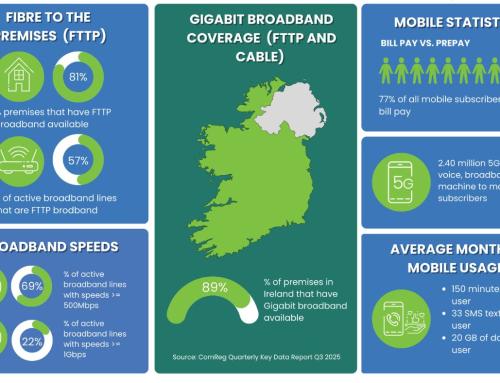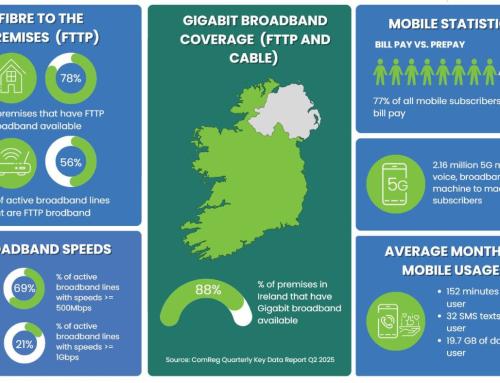Today’s Sunday Business Post IT supplement is no different.
You can read the article via the link I’ve provided above, but in essence they’re trying to make out that blogs are being replaced.
Personally I don’t agree at all.
I’ve been blogging for about 5 years at this stage. I started off doing it on a purely personal level, but over time my posts began to cover topics that were related to the business and the industry I work in.
Eventually I decided that there was no point not having a company blog, so I set this one up.
Facebook, Bebo, Twitter, Jaiku and any of the other “networking” sites that may appear in the future, are all wonderful tools in their own way.
Each site serves its users in its own particular manner and is probably geared towards a specific demographic. Just because a site exists does not mean that its demographic is really suited to your business. (Obviously this depends on what you are selling)
However, I honestly do not think that you can categorically claim that Bebo or Facebook can replace a blog.
We are active on both Facebook and Twitter, but we have also hooked our two existing company blogs into both systems, so instead of one replacing another we are using the RSS from the blogs to enrich the content we are publishing elsewhere.
You might also notice that every single page of our main website has the RSS feeds from both blogs and the forum. We also provide links to the two blogs via the customer control panel.
What that hopefully means is that people will be able to access the information we need them to access easily.
Unlike “traditional” marketing techniques RSS powered media, such as blogs, use “pull” instead of “push”.
What does that mean in reality?
Well instead of us sending you a marketing message (or industry information) we make it available in a manner that allows you to choose if you want to get it or not.
That doesn’t mean that we have abandoned more “traditional” marketing techniques – we still send out email newsletters to clients for example, and we spend quite a bit on print media advertising in Ireland, the UK and the US.
Some people talk about blogs and other media as being a way of engaging in a conversation and I guess that description is probably quite appropriate. We put ourselves “out there” whenever and wherever we can and are more than happy to take on board constructive feedback. Of course not all of our interactions with the public are successful and sometimes I’ll say something very harsh that I might not have said if I’d taken a few minutes to think before speaking!
If we can take action based on the feedback then hopefully we’ll be able to offer a better service to our clients and, in turn, make more money.
Yes – I am more than happy to admit it. We are a business. A business exists to make money. Period.
We have certain values that we consider to be important, but ultimately the main reason we decided to embrace the various outlets was to improve our sales and spend our marketing budget more intelligently.
It’s a simple philosophy.
If we can give people a good level of service and they are happy then we can make more money.
When I was first employed by EuroDisney 16 years ago they sent us all on a two day training course to give us an overview of the company, its history, values and more. One of the key lessons I learnt then and that I will always value is that of the happy customer vs. the unhappy one. An unhappy customer can cost a business a fortune. Their direct spend may not impact on your bottom line, but as most people give greater weight to personal recommendations a vocal critic can cost you a lot more than what they would have spent themselves. Conversely while happy clients may recommend you business more of them are likely to simply not say anything at all ie. you’re more likely to hear about your critics than your fans.
Does it work?
It’s hard to judge exactly how well it works using standard metrics. If we run an ad campaign on Google Adwords we can easily see how well that converts, but blogs and other “social media” (I really hate that term!) aren’t as easy to track. In many respects they are not that different from print media advertising – you only notice the real impact after a longer period of time.
Unfortunately the “web 2.0” phenomenom (if that is the correct word) seems to have spawned a lot of “consultants” and self-proclaimed “experts” who seem to spend more time playing buzzword bingo with their clients money than actually producing any real results.
Anytime I see people talking about “thought leadership” or “intelligence” or “increasing an organisations IQ” when talking about blogs I have to fight an overwhelming urge to puke.
More often than not the “consultants” who use those terms have little or no clue about business. Sorry, but that’s the distinct impression I get.
You can advocate social media until the cows come home, but you need to stop using stupid buzzwords to make yourselves appear more intelligent.
Business people don’t understand marketing buzzwords – they understand tangible examples.
If you can show them how embracing blogging and other media can help them make more money or reduce their customer service issues, then maybe you might make progress.
I would, of course, say something very similar to Open Source software advocates. Telling people that Microsoft is evil isn’t constructive. Showing an SME how they can achieve the same results for less investment by using Open Office is a lot more useful.
In summary blogs aren’t going anywhere anytime soon and while other platforms and media may be useful you’d be better off looking at incorporating them rather than dumping one medium in favour of another.
Maybe I don’t have a clue what I’m talking about, but I know what works for me!
15 Comments
Comments are closed.


![Reblog this post [with Zemanta]](http://img.zemanta.com/reblog_e.png?x-id=b40f5f6d-092e-4d43-ab75-56061bfa0bbf)






I completely agree with you Michele, I am glad that you addressed this issue.
“Business people don’t understand marketing buzzwords – they understand tangible examples.” This is a great way to sum it up.
I am currently a senior at Hawaii Pacific University majoring in Public Relations. This year I had the unique opportunity to interview Lee Webber President and Publisher of the Honolulu Advertiser and we were discussing this very issue. I believe that companies are just excited and wanting to serve that” Happy customer” that you mentioned above and the self proclaimed experts are just taking advantage of that. People must remember that things they read on internet is provided by its users and should not always be taken as fact. Yet should be researched like anything else. Finally if companies use social media, web 2.0 or what have you they should remember to ask the expert to provide them with measurable results in their terms like the quote listed above. Thanks for this article Michele
Buzzwords Are Go In Sunday Business Post
I wasn’t overly impressed with the article in this Sunday’s edition of Computers in Business which harped on about yet another death knell for blogs.You can read my reaction over on the company blog…
A blog is a blog and at the end of the day it is just a blog. But a blog can become so much more!
It is something that (perhaps, but usually) someone has setup for a specific reason.
IMHO blogs that survive more than a year are setup as someplace that friends can catch up on what’s been happening, someplace that one can air their thoughts but at a more controlable level than the likes of Bebo and Facebook. Not least of all if you have a blog then what you put up on it actually belongs to you. Not some company trying to generate revenue.
For me a distinguishing feature of a blog is that it is a personal endeavour. For all intents and purposes kind of like a diary. Except it is a diary that I don’t care if people read it or not.
Blogging I reckon easiest form of establishing a presence on the internet. It enables people to express themselves far more than the likes of facebook, myspace or bebo ever can.
As long a blogs promote individuality then there will always be a place for them. Anyone can create an account on facebook and the likes but expressing oneself becomes difficult to say the least!
As far a business blogging goes it should speak for itself as I’m now commenting on your companies blog! I’m a customer of yours, albeit for domain registration only. And unless I’m an exception, the Blacknight blog and Michele’s personal blog have been pivotal in my choice of Blacknight as my chosen registrar.
As I said already blogging promotes individuality. When it comes to trusting someone or some business then blogging is away of opening up and establishing trust with a potential customer or friend, or just providing information that someone may find useful!
As regards to social networks – Twentymajor hit the nail on the head sometime back when he stated that “Bebo is the special needs class of the internet.”
If the first thing you seek is a flow of readers or a large swath of comments, you might do better with a Bebo or Facebook page than with a blog post. And if that’s the metric the Sunday Business Post is using when writing its article, it’s consistent with suggesting a method to get the most views or comments.
However, I don’t think it’s wise to make Facebook and blogging mutually exclusive. In my experience, blogging delivers paying customers. Yet I also believe Facebook can do the same because I trust some of the people blogging about their time on Facebook.
So I’m off to update my Facebook status and poke you from there.
I agree completely.
I setup my blog around a year ago and I have written around 25 posts. This small amount of work has helped me to raise my profile in the Cloud Computing market. I have been invited to events, spoken at conferences and acted as judge on various awards. Almost all of these invites have come through my blog.
Long live the blog!
I have the stats to proove that blogging has raised my hits and profile in the year or so that I’ve been doing it, much more so than Facebook, Bebo, Linkedin, etc.. The best thing about it is that it creates dialog and gives a company a human face.
The only negative thing I can think of and perhaps the reason why some think blogging is dying is because every tom, dick and harry has a blog now and most of them are full of shit!
At some stage people might also cop the fact that a lot of businesses are starting a blog just because they want hits or because its the thing to do and not because they want to offer a genuine resource to customers.
@Nicole
In the current economic climate hopefully a lot of the fluffy promise merchants will disappear 🙂
Thanks for your comment
Michele
@Robert
Thanks for the feedback. I love the Twenty Major quote 🙂
Michele
@Bernie
So you read both? Or are you more likely to be reading blogs rather than facebook?
Michele
@Ross – glad you’ve kept it up. I remember you setting it up a couple of years ago 🙂
@Leon
There has been a lot of people and businesses starting blogs over the last year or two for all the wrong reasons. Some of them are really dire and just include links to their website and very little else!
Michele
@ Michele
Tell me about it, I setup all my clients with Blogs and a lot of them make an arse of it despite my words of wisdom. What can you do.
Leon
There isn’t a whole lot that you can do about that except point them in the direction of existing sites in the hope that they’ll learn
Michele
If there’s one thing I’ve learned about consultancy is that “in the land of the blind, the one-eye’s man is king”. I think it began to dawn on me back in the late nineties, when I would get up each morning, get my coffee and feel that I was really a bit of a fraud. Then I would log onto my email and after reading the pronouncements on a few of the lists out there would realize that no matter how bad I thought I was, most others were so, so much worse; not simply because they were clueless, but often because they were more interested in evangelizing an ideal than dealing with commercial reality.
Expert blogs are not a bad measure of a man, as it were, in this respect. They can give a very good indication of whether someone not only knows what they’re talking about, but also (and importantly) whether they are evangelists rather than experts. Where it comes to employing a consultant for your business, I believe this to be as important as their knowledge or experience – who wants to put their business into the hands of someone who’s personal mission is more important than the client’s interests, after all?
Excellent post Michele
Give it in plain English that prople can understand and not “buzzwords” to make yourself sound intelligent